Black Narrative Expression with Maassai
YOUNGBLACKCREATIVES
::
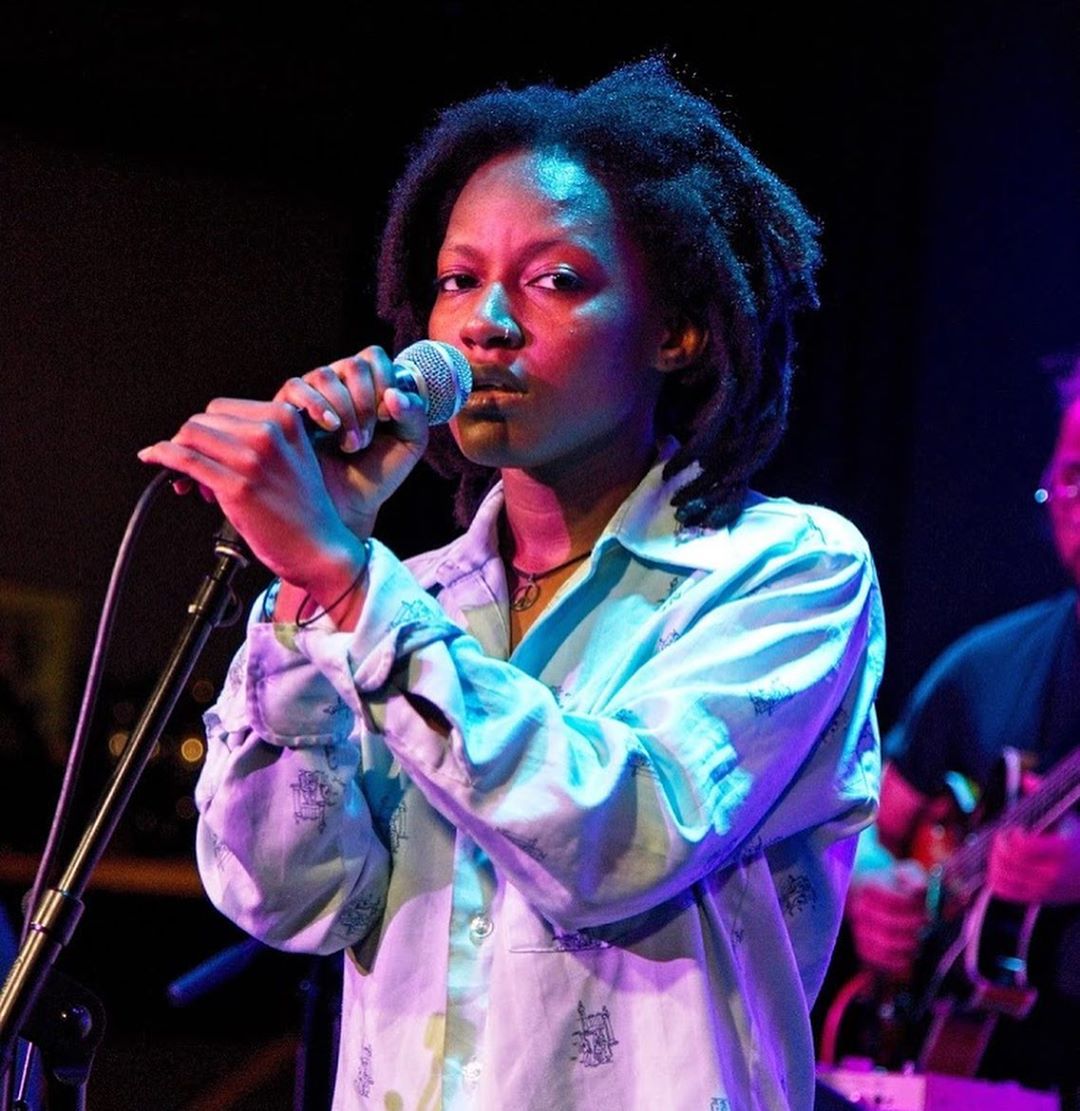 Maassai pulls no punches about the significance of her music.
Maassai pulls no punches about the significance of her music.
Hailing from Brownsville, Brooklyn, Maassai is a rapper intentional about the potential of art as a platform, clear about the audience for which she creates, and motivated by her ability to express her identity through writing. And, perhaps most memorably, Maassai is voracious with her bars: each verse of hers is penned with nimble wordplay and blunt confidence, delivered in her versatile flow. After hearing her verse on Pink Siifu’s “Golds and Smiles,” I was quickly taken by the way Maassai’s music sounds: throughout her 2019 project “C0n$Truct!0N,” she swings effortlessly between rapping and singing over eclectic production. On that project and her feature verses, Maassai’s raps include bare portrayals of personal realizations, desires, and confidence as a person and artist; her visions for the world around her; dissections of her Black womanhood within systems of oppression; and much more.
Maassai’s lyrics speak to her belief in the power of music and its relationship to Black life. In 2017, alongside two other artists, she started HouseFire, a pop-up, community-based nonprofit in East New York described simply as, “a creative space for emerging black artists.” In our conversation, sitting across from each other in a Bed-Stuy café, Maassai and I talked about the importance of a physical space for community development, as well as everything from her development as an artist to Black art’s role in revolution.
Our conversation left me fascinated about what happens when our art — Black art — is intentionally created to exemplify the futures we want to live, while also unraveling the complexities of the past; inherently, perhaps, a simultaneously activity?
But, who creates that music? And who is that music for? What does that music sound like? How do we translate these into physical space, and what happens when those spaces are cultivated? In one way or another, the lyrics in Maassai’s songs — and her words in this conversation — reflect the urgency of inquiries such as these, but also the tremendous power and excitement resting within their answers.
Go listen to Maassai’s SoundCloud, follow her on Instagram, and check out her show on February 18 at the Bowery Electric in NYC.
***
What got you started in your art career? What propelled you towards hip-hop music as a medium?
I had an interest in art from a really young age, just because I grew up around it. My grandmother was a jazz vocalist, and she was always playing music around the house and singing. I also grew up heavily saturated in hip-hop culture, cuz my mom rapped back in her day, and basically her whole generation is hip-hop heads. So I grew up saturated; everybody was a producer or a rapper, so I was kinda soaking in the culture as a kid. I think, when I got older, I was already into it, and I just found my own lane with it. Yea, that’s pretty much my introduction into art and music.
You mention being cultivated within hip-hop; what was special about that art form, specifically, that allowed you to express yourself?
I just got fascinated and obsessed with writing. When I was in middle school, I’d say… Cuz I started writing poetry when I was like 9, then I got really into it when I got to middle school. I went through, like… You know, middle school is that phase where you start realizing that life ain’t all peaches and cream? You start realizing things about your family, things about your upbringing and childhood. And so I kinda escaped into my writing as a way to just heal and keep myself sane. That definitely made my love for it really strong. It was just keeping me afloat.
Touching on the family element real quick, I remember your mom was at the Young World show in December for your performance. How has she and your family received your music as you’ve become your own artist?
Right. [laughs] It’s mad interesting having a family that’s into art because a lot of my friends, their issue with family and their art is usually their family didn’t encourage them to be an artist. I don’t necessarily have the same experience, but my family being kinda religious and also being kinda “hip-hop police,” that’s a whole thing. So when I first started making music, my family was tryna be super involved, and I had to cut ties with that cuz I was like, this is not what I’m trying to say, this is not who I’m trying to be with music. Now, that was the first time my mom had come to a show in a really long time, which is why that show was really special. But, she fucks wit it. That was beautiful that she was able to resonate with it, cuz I was nervous about her validation.
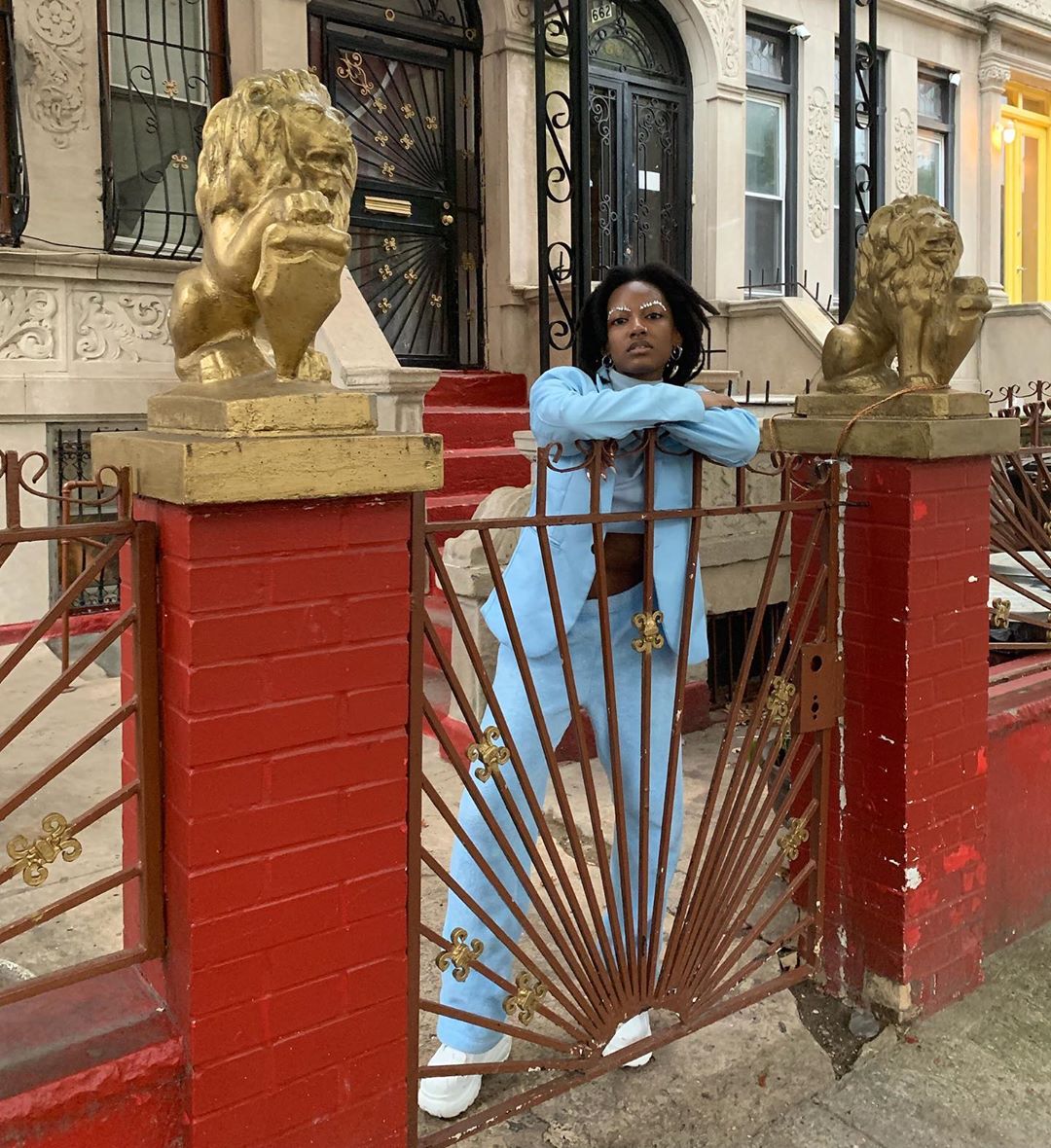
photo by @kristinxpowell on instagram
Who do you make your art for? Who affirms your art, essentially? Cuz I feel like it often might be, “if my family messes with it, then it doesn’t matter.” But, for you, who would you say your audience is?
I definitely think my audience is Black people, more specifically, Black women. Black queer people. Creative hood niggas. Just Black people in all our different, multifaceted elements and states. I definitely make music for them. Just letting niggas know, We can take up space. It’s cool.
Who affirms me? Yea, if Black people fuck with it, that’s the goal.
Talking about making art for Black women and queer people, did you see that growing up? Or is that something you had to make for yourself?
I was raised by Black women, essentially. I didn’t really have any male figures – at least positive ones – in my life. So, yea, I definitely feel like I owe Black women everything. And, also having a strong desire to push pass these gender binaries, I want to lay a platform… Especially as a woman who is a rapper, in terms of the way that we’re represented or even allowed to be represented to get recognition, is slim. So, I think it’s important for me to try and break some barriers within the rap world as a woman, and be like, Okay, nah, I don’t have to follow the scripts that you set. I don’t have to overtly sexualize myself – if that’s not what I want to do, you know? And, I don’t have to be super masculine of center to be able to fit in with the boy club, rap niggas, or whatever. I think that’s really my thing, just paving a way through it. And, obviously there’s been a bunch of women rappers who do that shit, who paved the way for all of us.
Yea, I remember you did a performance on YouTube in 2016 with the New School [below], and one of your lines was talking about objectification vs. liberation. And I feel like that’s a question for so many women in hip-hop now, but also throughout time. How has your thought process on that changed over the years?
Yea, I think they’ve definitely changed a lot. I feel like I’ve definitely had to do a lot of unconditioning, just from things I grew up thinking about women. Respectability politics, and shit like that. I think you definitely gotta uncondition a lot of that. I feel like as women, especially women in hip-hop, taking up space, we could take it up however we want, you know? We’re not contributing to hurtful or harmful ideas, we can take up space however we want to. Whether that means we wanna be mad sexy, or we wanna be mad bold and wild, or whatever the fuck.
But, I still do think that there can be a thin line between being objectified and being liberated, just because within a women’s liberation there’s still gonna be that gaze, and those niggas who are objectifying her. And…that’s just the way of the game right now. Gotta live with it. [laughs]
Okay, okay, yea, it’s a layered question. … Okay, so, first part of the question. Yea, I feel like I create for myself and my own healing, first and foremost. I do definitely create with certain intentions in mind but, I think for me, it’s all about being truthful and being honest in my work. And, I feel like as long as I’m doing that, then I am creating for those demographics that I mentioned, because inevitably that’s who I represent, you know?
When it comes to interacting with people who don’t represent those demographics, I mean, if they paying their bread to come see, then I’m not gonna turn down the coins. But, also, it gets hard, definitely, navigating a scene that is predominately male. And, yea, obviously some of them interact with the music a lot of the times in ways I don’t necessarily intend for, but I guess it’s just a part of the game. I just be having to breathe a little bit, and let it slip away.
One thing that’s interesting for me to see, too, is how you and some of your other Black women friends who are making music move as a group. What happens when creating amongst other people like yourself? What are you able to do in those spaces?
I feel like the Black women producers and vocalists, artists, rappers that I’ve been blessed to work with, it’s definitely a safe space. It feels really good to be able to just work with women who are on the same page, and have an understanding of what it means to be a woman creative in these predominantly male spaces, especially hip-hop. A lot of music and a lot of art spaces are male dominated, but I think specifically hip-hop can be a culture that is super hypermasculine in a lot of ways. A lot of it is about being big, and combative, and showy, and taking up space. That’s what it’s about. Which is why I think, as a woman, I feel like it’s a little cooler to be a rapper! Because taking up space as a woman is less redundant than taking up space as a man, cuz that’s the world that we live in already. So, it’s fun to be able to have very close friends of mine be navigating the shit with me. They’re like my rocks. JWords, KeiyaA, Akeema-Zane, Nappy Nina… There’s so many creatives.
https://www.instagram.com/p/BZ6stYLHogM/
You mentioned the masculine elements of hip-hop, and one of the things I also think is interesting is the competition part of it. How do you deal with building communally, but keeping in mind the competitiveness of art when it’s commodified and money’s involved? How do you balance ideas of competition with remaining true to your art and building collectively?
I mean, hm…I like to talk my shit.
I was about to say, cuz in your lyrics you go off!
Yeah [laughs], I like to talk my shit. The competition is a part of it. I know a lot of people who… Yea, for me, the competition is a part of it.
But competition doesn’t have to be inherently negative, or rooted in anything too crazy. I feel like I can be cocky, and I can strive to be the best at what I’m doing, without breaking down anybody else. Everybody who’s around me I support them, but I’m still trying to come for everybody’s head. At the end of the day, I’m tryna be the best at this, you know? And I feel like that’s just a part of rap culture. One thing somebody said recently…people are always talking about the way women in rap are put against each other, to compete. And, I understand where that’s harmful, cuz there’s just not many of us being seen, and so it definitely creates this air of us not supporting each other. But, rap being competitive, I think that all rappers should also be allowed to be competitive with each other if they’re taking a part in the culture…cuz this is the culture, you know? It doesn’t matter who you are, if you’re a man, a woman, if you’re nonbinary, whatever. We all in here, and… I don’t know. [laughs]
Yea, like you said, if it’s rooted in the idea that it doesn’t come with bringing somebody else down…
Yea, exactly.
…competition is just tryna be on your a-game.
Yea, tryna be on your a-game. When one of your friends drops a song that’s mad crazy, you’re like, Oh yea, I gotta come harder.
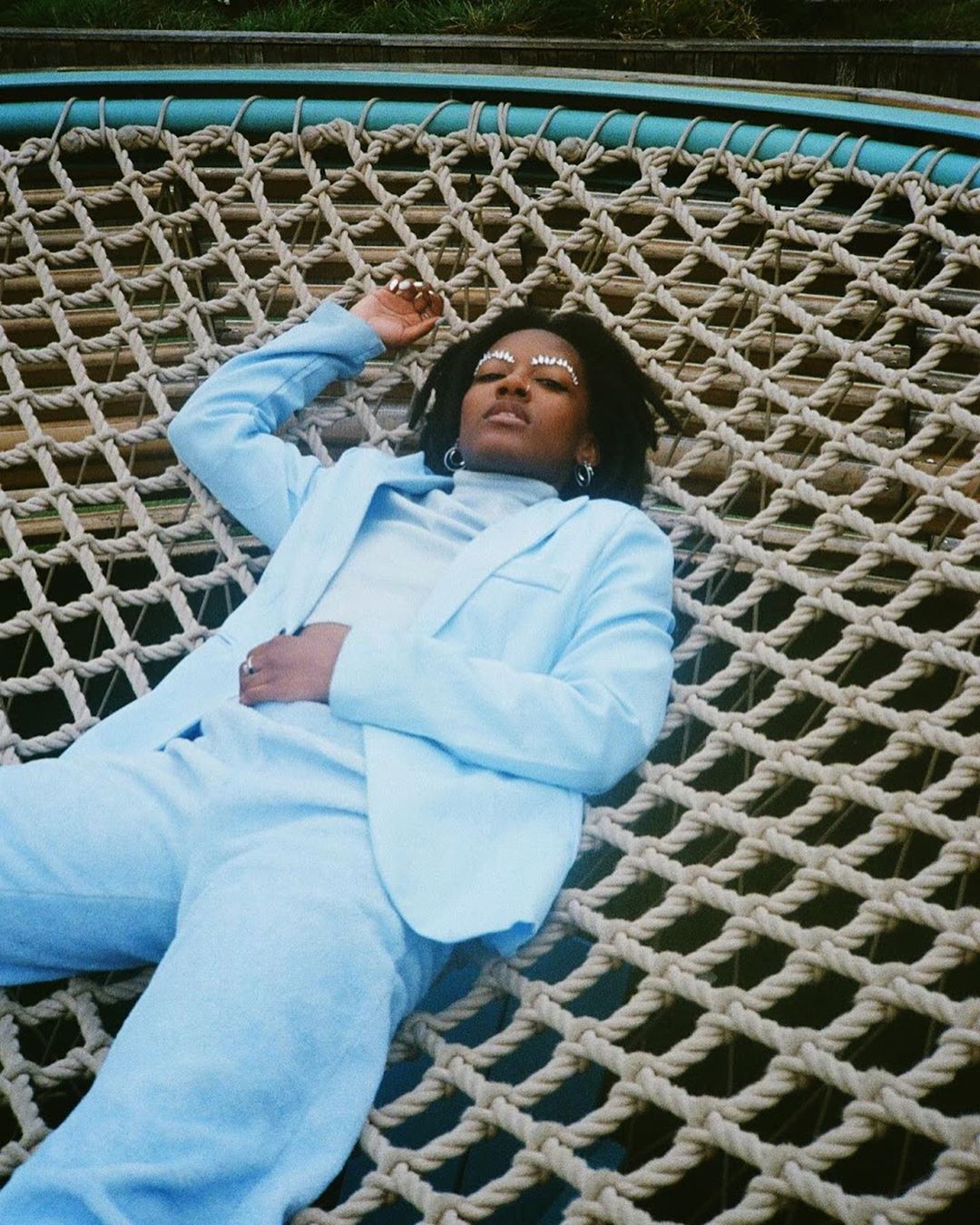
photo by @kristinxpowell on instagram
Yea, yea. I want to get a little to your music specifically. You talked about writing being a way for you to express yourself internally. How has the process of releasing music conflicted with that at all? You don’t put out music at as crazy a pace as some people, so how is your process with that?
My process is very interesting, because I really put… Well, first and foremost, I’ve taken long hiatuses from dropping music to kinda discover and find what I actually want to say in this world. And, sometimes I feel like, you know, I could compare music to food. There’s fast food, and then there’s homecooked food, where you put all the intent into it and you made the meal. And, for my personal process… It’s beautiful to just record songs, get the nut off or whatever. I enjoy that as well. But I feel like for my usual process, and what I want to do with music in using it as a platform for the groups that I said, I want to put a lot of intention into it. So, with that just comes a longer process. I’m a perfectionist, so I’ll record a song and listen to it, over and over and over and over again. And I’ll be like, uhmm okay, maybe that needs to be said differently, or maybe something needs to be added. So, I like to sit with my stuff. Especially when it comes to creating an album or something. Let me sit with this for a minute, to make sure I’m saying what I actually want to say. I plan to drop a lot of music this year though.
This year? Fire.
Yea, cuz now I feel like I’m just getting to the point where I’m confident enough in what I have to say. I have something to say, I’m not just talking shit.
That’s a really interesting distinction. I really want to touch on this idea of music being a platform for something, and therefore you put a lot of intent into it. Where do you want your music to go? What do you want it to do?
I think, essentially, music has always been the soundtrack for the revolution, in a lot of senses. Art guides the culture, essentially, and I feel like shifting the culture with my music and through any influence that I have is essentially what I want to do. Just, like, hood narratives and showing that we’re multidimensional. That we’re avant-garde and that hood narratives aren’t just remedial or negative. I think that’s a big thing. Yea, that’s my biggest thing. I want hood niggas to be seen as — and to see themselves as — more than what we’ve been told. Especially just growing up in Brownsville, in East New York, and seeing how there’s hardly anybody from the [art] scene that I know from those areas. There’s just a small ass circle of us. And, we were not encouraged to go out of this box of what we were taught. So I think that’s my main goal.
How much of that, you think, interacts with young people? Interacting with yourself and your peers, but also people growing up.
Yea. I was gonna say I don’t think my music is for kids, but it can be! If their parents are down with it. [laughs] But, yea, essentially I just make music for people like me. For a lot of us kids… I felt like an outcast growing up where I grew up cuz I was super into art and creative shit, I was thinking out the box or whatever, so I felt outcasted in some ways. But, when I went to college at the New School, which is predominantly white and the Black people move real different cuz they from higher social classes or whatever, I was like ehh, we not on the same shit. This is not how I grew up. So, I feel like just exploring the multifaceted nature of what it means to come from the hood…
When you talk about the multidimensional nature of it, how do you try to exemplify that through the total music? The writing, the sounds, the beats?
The beats I choose are more than definitely…super gritty sounds that remind me of New York City growing up, but just fucked up a little. And that’s essentially the sound I’m going for. Cuz I’m like yea, we gon get in there, but we gonna fuck it up. And that’s really just what I want to do with music. And in terms of the writing too, I like to be on my super existentialist shit, but in a minimal, kind of aggressive way. I feel like I like to dissect topics of deep prolific life shit by sourcing from elements of really tangible things around me.
On your verse on Medhane’s “2020sht,” you rap, “The estimates are clearly wrong about me/You are clearly wrong to doubt me,” and you say you’re a “pessimist to fear.” What are some of the personal, introspective lessons you’ve learned that influence your lyrics now?
Well, niggas definitely had a sorta difficult childhood, but I think I was always motivated by the fact that I felt like I had good ideas, and that’s always kinda kept me grounded. I think my approach to music is definitely just about dissecting and deconstructing those experiences that I’ve been through, and making sense out of them for me to be able to stay sane in hopes that they’ll also inspire others.
When did you realize the power music had? Was there a defining moment that showed you the potential?
Yeah, that was definitely middle school! In middle school, it was the sudden click in my head. Like, Woahh, I thought everything was gravy. Or, I didn’t necessarily think everything was cool, but I wasn’t realizing the way that things were affecting me. So, in middle school, all that came crashing down on me. So I just had my journal and I was just writing, writing, writing, writing. Then I realized, Oh yeah, I feel really good after I finish writing a verse. It feels like I just released more than I’ve ever been able to release. I realized, Yeah, this is some shit. I gotta be on my writing shit. And it’s still like that, every time. Whenever I’m going through anything, writing is just the biggest and best release I could get. It feels mad fulfilling.
Building on that, I wanna transition to HouseFire. I’ve seen a lot of the work you’ve been doing there; what is the importance of a physical space for some of the goals that fuel a lot of your art, whether it’s liberation of Black people and yourself?
Well, HouseFire was a pop-up space and unfortunately it’s no longer active. But it was a really fulfilling experience! It was started by a woman named Iman Essiet, an activist and visual artist; Amani Fela a curator, musician/sonic artist of many forms; and myself. We’re all artists of our own and that space was super important for all of us. I felt really connected to the vision especially because it was in East New York, my stomping grounds. So it was important for me to give back to that community, especially what I said about there not being a push for art and creation in those areas and in our schools in those areas. Cuz that’s a part of who we are as Black people. We are expressive. And then seeing what art has done for me, being able to express in that way, giving that platform or a physical space for people to come and do the same thing, I feel like is real revolutionary work, you know? And probably moreso than just rapping. So still definitely see a need for a physical space, and want to revive or do something along the lines of where people are able to do that in the hood, you know?
Talking about the revolutionary act of being expressive, can you talk about being a part of the current movement of rap music in New York? At the Mavi, Medhane, and Maxo show yesterday, where everybody’s there and it seems like a giant friend group making music, how does that feel? Is that something you anticipated when you made music?
Yea. It’s beautiful. It’s like, everybody is really supportive of one another in this community. Did I see myself here? Probably not really, no. Maybe last year, or two years ago, I had no belongings in the “scene”. I didn’t feel like I belonged anywhere; I was feeling crazy in every artistic community I was entering. I was like damn, I’m on some rap shit, but I’m over here hanging with mad jazz cats – cuz I’m super influenced by other genres of music and fusion. So I’m hanging out with mad jazz cats, and a lot of them are coming from this formal music education background, so there’s this condescension happening and there’s these class differences, so I’d feel crazy there. But then when I go to the rap shows, it’d just be a bunch of rap niggas hoggin the mic all the time, just like wylin out. And I’d be like, Oh god, talk about something different. Just bored, kinda. Mundane, redundant shit. So now, I feel like I’ve found a community where niggas are on the same page with shit. And not in terms of the way we make music or the music that we make, but where I feel like that essence of being multifaceted is just being respected and delved into. That feels good.
https://www.instagram.com/p/BuRLqUyHT_8/
Yeah. What are some of the other influences you listen to? You’ve mentioned it a couple times.
I’m super influenced by fusion music. Inevitably, I feel like as I continue to make music, it’s probably going to get more and more fusion based, because it just seems that’s where I’m going with it. Super inspired by Sun Ra, Tony Williams, Alice Coltrane, also super inspired by soul music. I think that’s one of my biggest inspirations, because I grew up on neo-soul as well. So, D’Angelo, Bilal, Erykah, Lauryn Hill, these people essentially are hip-hop in mad ways, but also are fusing… Cuz neo-soul is kinda like a fusion in itself, of hip-hop and R&B, jazz, you know, so many different things. So, super into that shit. I could really fuck with a little bit of everything.
Lastly, you talked about an album, how is it coming? How are you feeling about the process?
Yea, I’m really excited about the album. I’m also about to drop C0N$TRUCT!0N 002 which is a multidisciplinary art project taking the form of an event series. So, I’m dipping back into my curator bag – I’d say I’m equally passionate about curating as I am about music. So that’s approaching really soon. My album is gonna come out a lil later this year and I’m also dropping a few collab projects with friends this year, like JWords and Keenyn Omari.
Firee. Okay, lastly forreal, why curating? Why does that inspire you?
I think curating is just holding space for art – and not only art: conversations, whatever. But holding space for things to be created. Whether it’s ideas, inspiration, dialogue. I feel like that’s true revolutionary work. If I can fuse my art with creating these revolutionary spaces, or these spaces that have a lot of intent and a goal, then I feel like that’s a good combo.
::
YOUNGBLACKCREATIVES
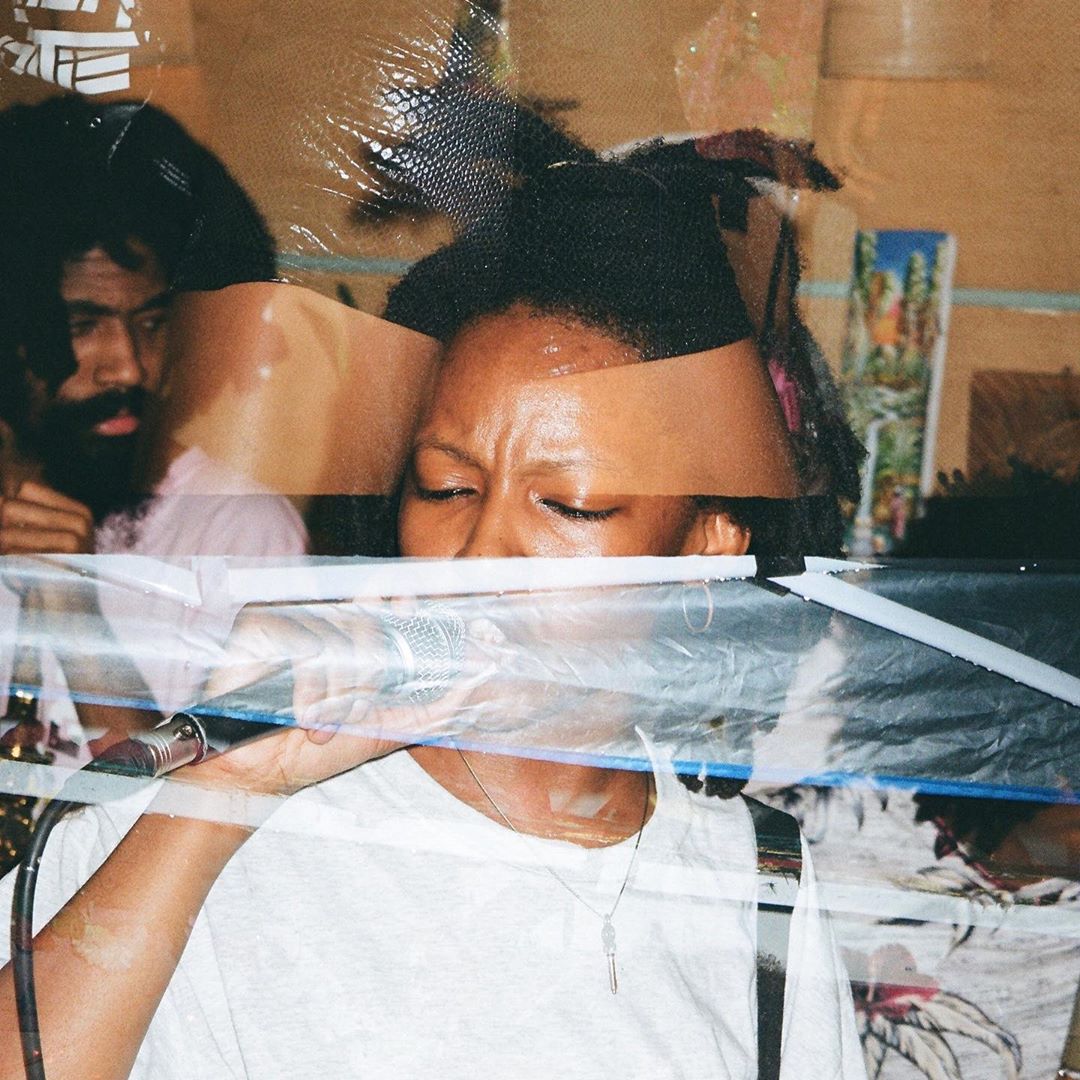
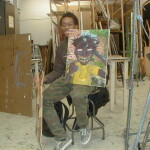 Previous Post
Previous Post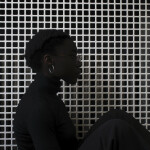 Next Post
Next Post